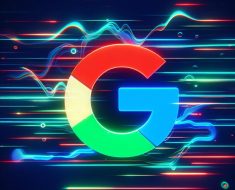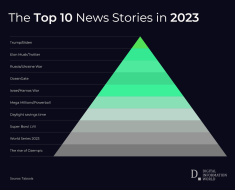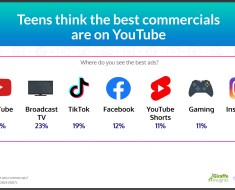Over the last 40 years, there’s no invention more significant than Google, which in itself is a milestone in information technology. From a humble dissertation to one of the biggest companies in the world, it’s become a benchmark of what you can do with smart people and the drive to change the world.
However, as information becomes more accessible, newer frontiers are being explored. Today, there’s a lot of focus on artificial intelligence. At the forefront of it all is OpenAI with their groundbreaking products such as ChatGPT and DALL-E.
With Google also trying to penetrate the AI market, can OpenAI take a shot at this tech giant and claim the AI space for themselves? Can OpenAI achieve a similar level of influence as Google? That’s what I’ll be discussing today.
Here are 12 unique perspectives on the matter from thought leaders and industry veterans around the world.
OpenAI’s Potential In The Digital Space And Society


Google, OpenAI, and The Future of Information Access
Right from the start, OpenAI and ChatGPT are already on track to be one for the history books. To build this powerhouse, Sam Altman recruited the smartest minds in deep learning and artificial intelligence and it shows. It had one of the most successful product launches in history, with more than 100 million active users in under a year. This is something that Google never accomplished with any of its products.
As Elijah Pushakov, the Chief Commercial Officer and Project Manager of Restaurantji, puts it:
“In 1998, Google revolutionized information retrieval by listing the most relevant web pages. They further enhanced this in 2014 with featured snippets, summarizing key information. However, OpenAI has taken a significant leap forward with ChatGPT. It provides information in a conversational manner, delivering exactly what the user requests in a concise and tailored format. This is a considerable time-saver and a groundbreaking advancement in information retrieval and AI technology.”
This statement is also backed by Lucas Ochoa, the Founder and CEO of Automat, who also emphasized the impact ChatGPT has on information access in the 21st century:
“Today, compared to ChatGPT, Google search appears less efficient, largely because of the income-generating business model behind it. ChatGPT and OpenAI threaten and will likely spell the end of online search functions in their current form, which is Google’s main business model. […] LLMs might take over traditional searching. While I don’t think Google will try to crush ChatGPT, the AI and search engine industry will definitely become more competitive.”
The Implications of AI in Society
OpenAI also separates itself from other AI companies by focusing on creating systems that would benefit our society, which is their ultimate goal. They’re also heavily investing in AI governance and safeguards like Superalignment which can prevent models from going rogue, ala-Skynet.
Mac Steer, the Owner and Director of Simify, has this to offer regarding OpenAI’s future:
“OpenAI has the potential to be a huge force for good in the world. Right now, I think it’s still too early to tell. But, if it is able to achieve its goal of creating truly intelligent machines, I think we can expect them to have a similar level of influence as Google. Google has become so influential because it’s managed to create products that are so intuitive and easy-to-use that they’re the first thing people turn to when they want answers or help with anything. If OpenAI is able to create intelligent machines that can do the same thing, then I think we’ll see them become just as influential—if not more so.”
Writing With ChatGPT
On a much smaller scale, OpenAI is also actively changing the way we write. Since ChatGPT was released, content creation has been simplified and streamlined. Most outlining and research has now become verification tasks rather than exploration and analysis — and that’s thanks to OpenAI.
For John Frigo, the E-Commerce Manager of Best Price Nutrition, the best use case of ChatGPT in SEO is article spinning:
“For anyone who was into SEO or marketing back in the early 2000s, there were “article spinners” where you could basically plug in an article and have it spin out “unique” content. They were pretty terrible. In many ways, however, that’s all ChatGPT is – a smarter article spinner. I wouldn’t say it has original thoughts or writes in a tone or voice that most people enjoy. It can be helpful for things like spitting out quick paragraphs or even outlining a blog post, but it’s not really good for start-to-finish content creation.”
Why OpenAI is Poised To Challenge Google


While OpenAI may be on a path to greatness, it’s undeniable that Google has a head start over this relatively new company. Luciano Colos, the Founder and CEO of PitchGrade, puts it best:
“Google’s AI capabilities are deeply embedded in its vast array of products and services, from search and advertising to cloud computing and mobile operating systems. Google’s search engine is practically a monopoly on the internet, with a market share close to 90%. This dominance not only gives Google a massive user base for its AI technologies but also generates substantial revenue that can be reinvested in AI research and development. On top of its core search business, Google also owns a diverse portfolio of successful companies, including YouTube, Android, and Waymo. This breadth of offerings provides Google with a resilient business model and further strengthens its position in the tech industry.”
However, OpenAI’s lack of established partnerships may work to its favor in the long run. The company is basically a blank slate — an ecosystem waiting to be populated. With their intelligent systems and novelty, OpenAI will become a force to be reckoned with, if they aren’t already. Yoana Wong, the Co-Founder of Secret Florists, adds:
“OpenAI can achieve a similar level of influence as Google by prioritizing collaboration with smaller, specialized AI startups. By supporting and partnering with these startups, OpenAI can foster an ecosystem of innovation and leverage their breakthroughs. This approach allows OpenAI to expand its influence by tapping into the collective expertise of a diverse range of AI companies. For example, OpenAI could collaborate with a healthcare-focused AI startup to develop advanced medical diagnostic tools. By combining OpenAI’s research capabilities with the startup’s industry-specific knowledge, they can make significant contributions to the healthcare sector and establish themselves as a tech giant.”
The Current Trajectory Of OpenAI


When talking about OpenAI’s path to success, I haven’t seen anybody put it as succinctly as Mike Sadowski, the Founder and CEO of Brand24:
“I’ve closely observed the evolution of technology and its impact on businesses. When considering the potential of OpenAI to achieve a level of influence similar to Google, I believe it’s definitely more than a possibility. It’s a likely trajectory.”
And he’s right. OpenAI has all the tools they need to succeed, and they’ve had them since the very beginning. Keep in mind that they were a billion-dollar company right from the beginning. Not to mention that they’re led by brilliant minds like Sam Altman and Ilya Sutskever. In a straight competition with Google, Sadowski also adds:
“Let’s consider the landscape: Google revolutionized information access, becoming a cornerstone of the digital age. OpenAI, with its groundbreaking advancements in AI, is positioned to lead a similar revolution. The key here is the transformative nature of AI technology. Just as Google made information universally accessible, OpenAI is democratizing AI, making powerful tools like GPT-3 accessible to businesses and developers.
However, becoming a tech giant like Google isn’t just about having groundbreaking technology. It’s about ecosystem integration, user adoption, and continuous innovation. Google didn’t just create a search engine; they built a whole ecosystem around it.”
OpenAI’s Trajectory On Niche Industries
The applications of OpenAI are limitless. We’ve already seen what it can do for education, writing, and information access. However, it should also penetrate even the most niche industries. Here’s an example from Samantha Odo, the Real Estate Sales Representative and Montreal Division Manager of Precondo:
“From my perspective in real estate, I can see the potential impact on property valuation, market predictions, and customer service. Imagine AI-driven tools that can analyze vast amounts of data to predict future property values or assist clients in finding their dream homes more efficiently. It’s a game-changer.”
Skepticism Over OpenAI’s Long-Term Stability
However, even with all the things going for OpenAI, some industry leaders remain skeptical — and rightfully so. There’s been a lot of chatter regarding the company, especially with recent leadership news, which we’ll get to later. Brett Downes, the Founder of Haro Helpers, bets on Google becoming the long-term winner of this head-to-head because of these reasons:
“Becoming a tech giant is far different from remaining one. It may be simple to become an overnight sensation, rocketing with stocks and investments when everyone thinks a tech company could be something. However, whether or not that company has a good plan for the long run will determine if it stays a tech giant, which is why I think OpenAI won’t become as big as Google.
Google is Google; Microsoft is Microsoft. They have harnessed technological ability and built a massive, inclusive platform on it. While OpenAI has potential, given the rapid evolution of technology, I don’t believe that it will stay ‘OpenAI’ at its core.
Stable growth will benefit a tech company more than rapid growth because stable growth is sustainable. Rapid growth is destined to hit a plateau at some point and more than likely see a downward trend from there.”
The Challenges We Have To Consider With OpenAI


Leadership Shake-Up Clouds OpenAI’s Future
Last month, Sam Altman was fired as CEO of OpenAI. Since then, he has been replaced, brought back, and changed the leadership behind the company. While it’s entertaining to watch it unfold from a consumer perspective, the drastic changes behind the company definitely does not speak well to its stability. Trevor Ewen, the Chief Operating Officer of QBench, puts it like this:
“OpenAI’s recent leadership shakeup seems to be quite an unforced error. The company has achieved amazing success given its size and unique structure. However, this decision by the board shows the fragility of the OpenAI business model and most likely portends a rough future for the company, particularly in challenging well-resourced incumbents like Google or Microsoft.”
OpenAI’s Need for a Development Shift
Paul Eidner, the Chief Operating Officer of CarnoGel, also offers some insights into the need of OpenAI to shift its developmental focus and be at the forefront of innovation.
“The potential for OpenAI to achieve the same level of influence as Google is there, but I don’t think they’ll achieve it without a major shift in the way they approach their AI development. As of right now, OpenAI has been focusing on using AI to solve specific problems and make specific products. They’ve done a lot of work with healthcare, for example, and have created an algorithm that can help doctors diagnose cancer with more accuracy than ever before. This is great! But it’s not enough—we need OpenAI to start thinking about how to use AI in new ways that haven’t been explored yet. It’s not just about making things better—it’s about creating new opportunities that nobody has even dreamed of yet.”
OpenAI’s Challenges to Google-Level Ubiquity
There are no bigger household names in technology than Google, Apple, and Microsoft. These are the companies that, no matter if you’re a digital nomad or from an older generation, you’d recognize. This is the steep climb that OpenAI’s trying to conquer: breaking through the industry and achieving the level of ubiquity that rivals these tech giants.
Among the quotes we’ve received from industry leaders, I believe that this message from Vikrant Shaurya, the CEO of Authors On Mission, perfectly encapsulates what OpenAI needs to do in order to surpass Google:
“OpenAI has already made waves in AI research, but achieving Google-level ubiquity will require overcoming key challenges. Unlike Google’s focused beginning in search, OpenAI tackles the extremely difficult pursuit of general artificial intelligence. This moonshot vision could lead to groundbreaking innovations, but also a higher risk of undiscovered complexities.
While attracting top AI talent and substantial investment, OpenAI lacks Google’s computational infrastructure advantage from owning its own data centers and fiber network. Competing with tech giants vying for the same AI breakthroughs will test OpenAI’s long-term viability. However, if they achieve milestones like human-level conversation before competitors, they could rapidly gain market share and impact. As a mission-driven nonprofit, OpenAI’s incentives differ from commercial tech firms, possibly limiting its scale.”
The Bottom Line
OpenAI is here to stay — but so is Google.
At the end of the day, even if Google fails at the AI space, there’s still no company that’s remotely close to beating them in information technology. You can argue that ChatGPT functions similarly to search engines, but it’s missing a crucial factor:
Humanity. The ability to decide whether or not a piece of information is worth keeping or not. Google might not have the ability to think for itself, but that’s what we’re here for.
So, do I believe that OpenAI will surpass Google? The best I can do is a maybe. We can’t tell the future. But here’s what I know: The world is wide enough for both companies.
The only question is, can OpenAI rise up to the challenge?





